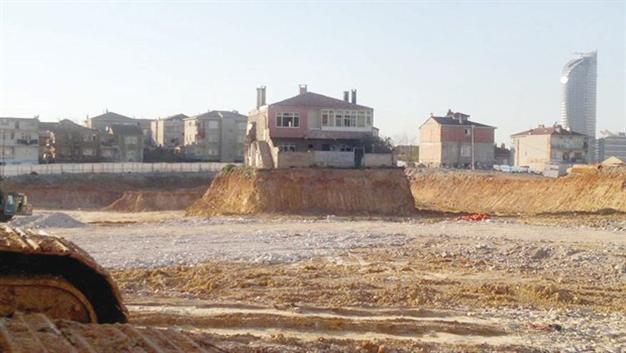Family resists lucrative urban transformation project in popular Istanbul neighborhood
Gülistan Alagöz ISTANBUL / HÜRRİYET

In Fikirtepe alone, 50,000 housing projects are expected to be built in the next three years, generating an economy of around 40,000 billion Turkish Liras. HÜRRİYET Photo
Urban transformation projects are running at full gallop across Istanbul, but in the popular neighborhood of Fikirtepe, a local family is resisting giving his approval for the demolition of his house.Despite all of the buildings in its surroundings being completely eradicated with the area turned into a construction field, the landowner refuses to sell his property without a clear contract.
The landowner, A.D., persists on keeping his house unless the company carrying out the projects offers a concrete deal, while rejecting the accusation that he is asking for more money.
“We want problems regarding [urban transformation projects] to be solved. We had to evacuate the house after they cut the electricity and the water. They are harassing me by phone because I did not make an agreement. But I asked the company for a clear deal and guarantee. It is not about greed or asking for more money,” A.D. told Hürriyet.
 The landowner’s case in fact reflects a larger situation in this Asian-side neighborhood, whose location makes it attractive for lucrative projects. While most of Fikirtepe’s inhabitants have a low income level, the neighborhoods is both close to the roads connecting to the Bosphorus Bridge and within the borders of the upmarket Kadıköy district.
The landowner’s case in fact reflects a larger situation in this Asian-side neighborhood, whose location makes it attractive for lucrative projects. While most of Fikirtepe’s inhabitants have a low income level, the neighborhoods is both close to the roads connecting to the Bosphorus Bridge and within the borders of the upmarket Kadıköy district.In Fikirtepe alone, 50,000 housing projects are expected to be built in the next three years, generating an economy of around 40,000 billion Turkish Liras.
According to the law, companies can kick off demolitions if they reach an agreement with two-thirds of the landowners of a certain area. However, companies complain that what is called “the majority rule” cannot be implemented in practice, further appealing to the Environment and Urban Planning Ministry to increase pressure on local citizen associations. The companies say that despite that, those who have not agreed should have evacuated their homes in December, in many areas, construction has not started since.
Another issue that halted construction is the disagreement between the district municipality and the Environment and Urban Planning Ministry about who owns the parcels where residents have desisted from their rights by their own consent.
Kadıköy’s mayor Aykurt Nuhoğlu, stresses that the district municipality was left outside of the decision tracks for urban transformation projects, adding that this factor has long played in the detriment of the residents. “We are working to establish an urban planning department. If there is a legal right that falls upon the district municipality regarding those areas abandoned by residents, we will conduct research [to determine it],” Nuhoğlu said.
The Environment and Urban Planning Ministry argues that the parcels should go to the treasury and the ministry will decide if they will be then transferred to the country’s omnipresent state-run housing agency, TOKİ. But Minister İdris Güllüce assured to keep those areas away from lucrative projects, building instead public spaces such as parks, green areas or schools.

















